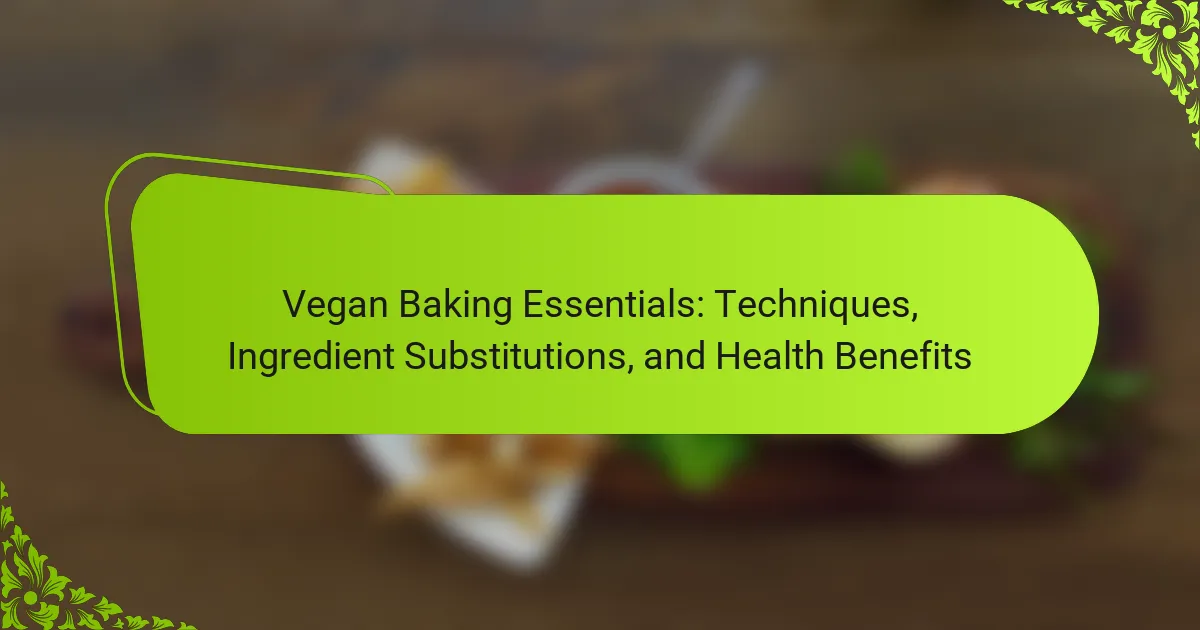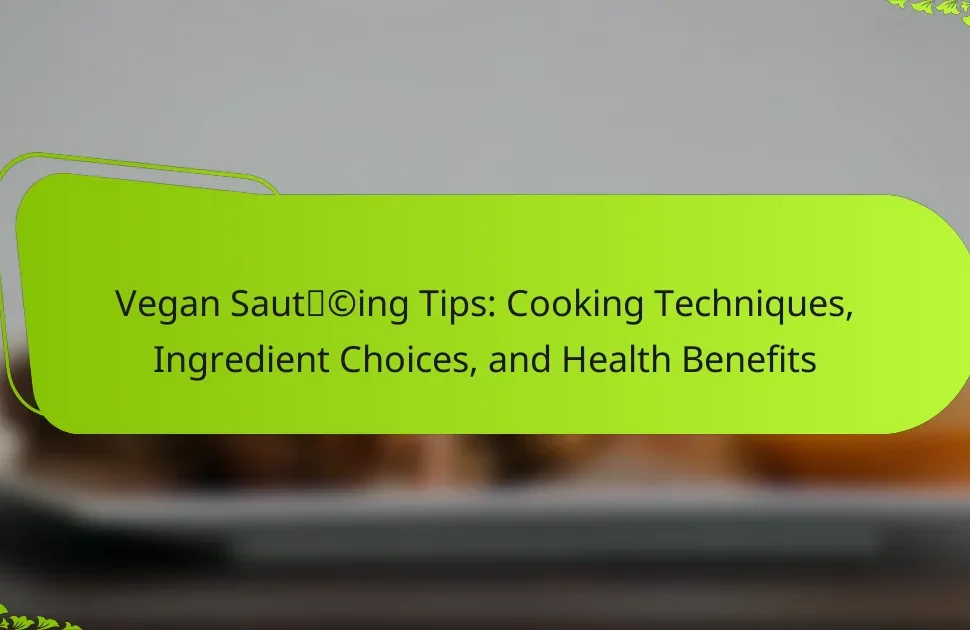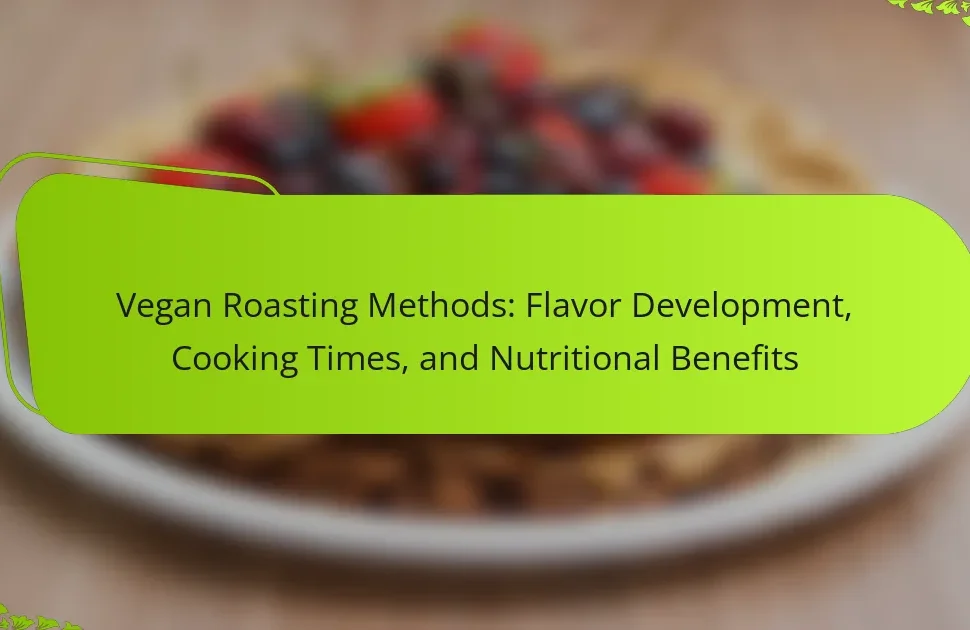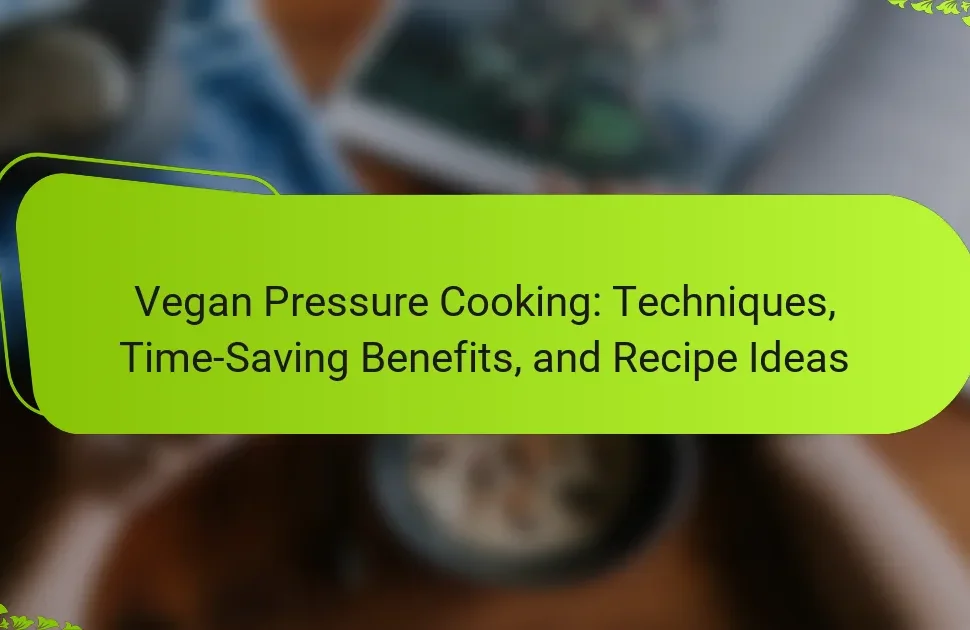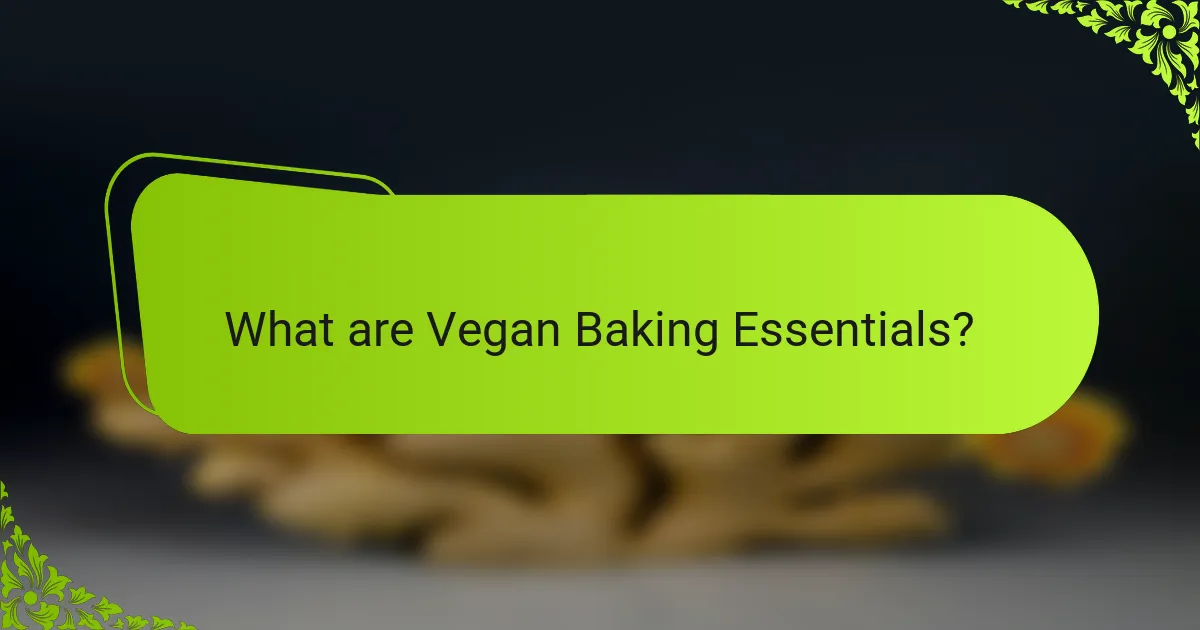
What are Vegan Baking Essentials?
Vegan baking essentials include plant-based ingredients that replace traditional animal-based products. Key ingredients are flour, sugar, baking powder, and plant-based milk. Common substitutes for eggs are flaxseed meal and applesauce. Vegan butter or coconut oil serves as a replacement for dairy butter. Aquafaba, the liquid from canned chickpeas, can act as an egg white substitute. Nuts and seeds provide texture and nutrients in vegan recipes. Understanding these essentials allows for successful vegan baking. These ingredients are widely available and versatile for various recipes.
How do vegan baking techniques differ from traditional baking?
Vegan baking techniques differ from traditional baking primarily by omitting animal products. Instead of eggs, vegan recipes often use substitutes like flaxseed meal or applesauce to provide binding. Dairy milk is replaced with plant-based alternatives such as almond or soy milk.
Vegan recipes typically require different leavening agents. For instance, baking soda and vinegar can replace eggs for rising. Additionally, fat sources like butter are substituted with oils or vegan butters.
These adjustments impact texture and flavor, necessitating experimentation. Vegan baking often results in denser goods compared to traditional methods. Understanding these differences is essential for successful vegan baking outcomes.
What are the key methods used in vegan baking?
The key methods used in vegan baking include ingredient substitutions, moisture retention techniques, and leavening agents. Ingredient substitutions replace eggs and dairy with alternatives. Common substitutes for eggs are flaxseed meal and applesauce. Dairy can be replaced with plant-based milks and yogurts. Moisture retention techniques ensure baked goods remain soft. Adding ingredients like mashed bananas or nut butters helps with moisture. Leavening agents like baking soda and vinegar create rise without eggs. These methods are essential for achieving texture and flavor in vegan baked goods.
How does temperature affect vegan baked goods?
Temperature significantly affects the texture and rise of vegan baked goods. Higher temperatures can lead to faster baking, resulting in a drier texture. Conversely, lower temperatures may yield denser products due to insufficient rise.
The Maillard reaction, which enhances flavor, occurs more readily at higher temperatures. Vegan baked goods often rely on ingredients like aquafaba or flaxseed for binding, which can behave differently based on temperature.
For instance, aquafaba may whip better at cooler temperatures. Additionally, the melting point of fats like coconut oil influences the final product’s consistency.
Research indicates that optimal baking temperatures for vegan cakes typically range from 325°F to 350°F. This range helps achieve a balance between proper cooking and moisture retention.
What ingredients are essential for vegan baking?
Essential ingredients for vegan baking include flour, sweeteners, plant-based milk, and binding agents. Flour serves as the primary base for structure. Common choices are all-purpose, whole wheat, or gluten-free varieties. Sweeteners like maple syrup or agave nectar provide necessary sweetness. Plant-based milk, such as almond or soy milk, replaces dairy milk for moisture. Binding agents like flaxseed meal or applesauce act as substitutes for eggs. Leavening agents, such as baking powder or baking soda, help baked goods rise. Additionally, oils like coconut or vegetable oil add moisture and richness. These ingredients collectively enable successful vegan baking without animal products.
Which plant-based alternatives can replace dairy ingredients?
Plant-based alternatives that can replace dairy ingredients include almond milk, soy milk, coconut milk, oat milk, and cashew cream. Almond milk is low in calories and has a nutty flavor. Soy milk is high in protein and often fortified with vitamins. Coconut milk provides a rich, creamy texture and is ideal for desserts. Oat milk is naturally sweet and works well in baking. Cashew cream can be used as a substitute for heavy cream due to its smooth texture. These alternatives are widely available and can be used in various recipes, making them versatile for vegan baking.
What are the best egg substitutes for vegan baking?
The best egg substitutes for vegan baking include flaxseed meal, chia seeds, applesauce, and silken tofu. Flaxseed meal acts as a binding agent when mixed with water. One tablespoon of flaxseed meal combined with three tablespoons of water equals one egg. Chia seeds provide similar properties; one tablespoon of chia seeds mixed with three tablespoons of water can replace one egg. Applesauce adds moisture and sweetness; one quarter cup of applesauce replaces one egg. Silken tofu can create a dense texture; one quarter cup of blended silken tofu substitutes for one egg. These substitutes maintain the structure and moisture in baked goods.
Why is understanding ingredient substitutions important in vegan baking?
Understanding ingredient substitutions is crucial in vegan baking because it allows bakers to create recipes without animal products. Vegan baking often requires replacing eggs, dairy, and other animal-derived ingredients with plant-based alternatives. Knowledge of these substitutions ensures the final product maintains the desired texture and flavor. For example, applesauce can replace eggs for moisture, while almond milk can substitute dairy milk. This flexibility enables bakers to cater to dietary restrictions and preferences. Additionally, understanding substitutions can enhance nutritional value by incorporating whole food ingredients. Overall, mastering ingredient substitutions is key to successful vegan baking.
How do ingredient substitutions impact the texture and flavor of baked goods?
Ingredient substitutions significantly impact the texture and flavor of baked goods. For instance, replacing butter with coconut oil alters the fat content, resulting in a denser texture. Using applesauce instead of eggs introduces moisture, affecting the overall crumb structure. Substituting all-purpose flour with almond flour changes the protein content, leading to a more tender product. Additionally, non-dairy milk can impart different flavors and moisture levels compared to cow’s milk. These changes can enhance or diminish the final product’s taste and mouthfeel. Research indicates that ingredient modifications can shift the balance of sweetness and richness in baked goods, further influencing consumer preferences.
What are common mistakes to avoid when substituting ingredients?
Common mistakes to avoid when substituting ingredients include not understanding flavor profiles. Each ingredient has a unique taste that affects the final product. Ignoring texture can lead to undesirable results. For instance, substituting a liquid for a solid without adjusting other elements can alter consistency. Using incorrect ratios is another frequent error. Substitutions often require adjustments in quantity to maintain balance. Failing to consider cooking times can impact the outcome, as some substitutes cook differently. Not testing substitutes beforehand can result in unexpected flavors or textures. Lastly, overlooking dietary restrictions can lead to unsuitable ingredient choices.
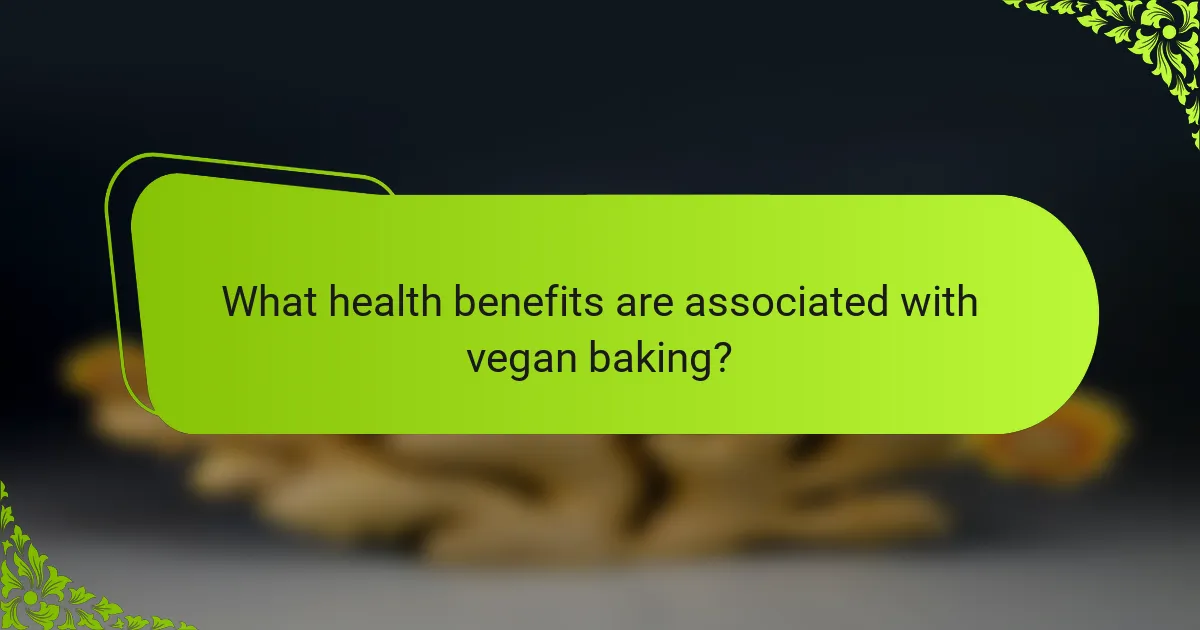
What health benefits are associated with vegan baking?
Vegan baking offers several health benefits. It typically reduces saturated fat intake. This is due to the absence of animal products. Lower saturated fat can lead to improved heart health. Vegan baked goods often contain more fiber. Increased fiber intake supports digestive health. Many vegan recipes use whole grains and fruits. These ingredients provide essential vitamins and minerals. Vegan baking can also lower cholesterol levels. Plant-based diets are linked to a reduced risk of chronic diseases. Studies show that vegans have lower body mass indexes. This indicates a healthier weight profile compared to non-vegans.
How does vegan baking contribute to a healthier diet?
Vegan baking contributes to a healthier diet by replacing animal products with plant-based ingredients. This substitution often results in lower saturated fat content. Vegan baked goods typically contain more fiber, derived from whole grains and fruits. Increased fiber intake is linked to improved digestive health. Additionally, vegan baking uses natural sweeteners, which can reduce refined sugar consumption. Many plant-based ingredients are rich in vitamins and minerals, enhancing overall nutrient intake. Studies show that plant-based diets can lower the risk of chronic diseases. Therefore, vegan baking supports a balanced, health-conscious lifestyle.
What nutrients are typically higher in vegan baked goods?
Vegan baked goods typically have higher levels of certain nutrients compared to traditional baked goods. These include fiber, antioxidants, and certain vitamins and minerals.
Fiber is often higher due to the use of whole grains, nuts, and seeds. Antioxidants are prevalent from ingredients like fruits and dark chocolate. Vitamins such as vitamin E and various B vitamins are abundant in nuts and seeds. Minerals like magnesium, potassium, and iron are also more concentrated in vegan ingredients such as legumes and whole grains.
Research indicates that vegan diets can lead to increased intake of these nutrients, promoting better health outcomes. Studies show that plant-based diets are associated with lower risks of chronic diseases, highlighting the nutritional advantages of vegan baked goods.
How can vegan baking help with dietary restrictions?
Vegan baking can help with dietary restrictions by eliminating animal products. This makes it suitable for those with lactose intolerance or egg allergies. Vegan recipes often use plant-based substitutes like applesauce or flaxseed meal. These alternatives provide moisture and binding properties without using eggs. Additionally, vegan baking can cater to gluten-free diets by using gluten-free flours. Many ingredients in vegan baking are naturally free from common allergens. For instance, almond flour is a popular substitute for wheat flour. This adaptability allows individuals with specific dietary needs to enjoy baked goods. Studies show that plant-based diets can improve overall health and reduce allergy symptoms.
Why should one consider vegan baking for health reasons?
Vegan baking should be considered for health reasons due to its potential to reduce cholesterol levels. Traditional baking often includes eggs and dairy, which can raise cholesterol. In contrast, vegan recipes use plant-based ingredients that are naturally cholesterol-free. Studies show that a plant-based diet can lower the risk of heart disease. For instance, research published in the Journal of the American College of Cardiology indicates that plant-based diets can significantly improve heart health. Additionally, vegan baking often incorporates whole grains and fruits, which are high in fiber. Increased fiber intake is linked to better digestive health and weight management. Thus, vegan baking supports a healthier lifestyle by promoting heart health and providing essential nutrients.
What are the long-term health benefits of a plant-based diet?
A plant-based diet offers long-term health benefits such as reduced risk of chronic diseases. Studies show that individuals following this diet have lower rates of heart disease. Research indicates that plant-based diets can lower blood pressure and cholesterol levels. This dietary approach is associated with a decreased risk of type 2 diabetes. Additionally, a plant-based diet can promote healthy weight maintenance. It is rich in fiber, which aids digestion and supports gut health. Nutrient-dense foods in this diet provide essential vitamins and minerals. Overall, adopting a plant-based diet contributes to improved overall health and longevity.
How does vegan baking compare to traditional baking in terms of health?
Vegan baking generally offers health benefits compared to traditional baking. It often contains lower levels of saturated fats and cholesterol. This is primarily due to the absence of animal products. Vegan baked goods typically utilize healthier fats, such as vegetable oils or nut butters. These alternatives can provide beneficial nutrients, including omega-3 fatty acids.
Additionally, vegan baking frequently incorporates more whole grains and fruits. This can increase fiber content and essential vitamins. Studies show that diets high in plant-based foods are linked to reduced risks of chronic diseases. For example, a review published in the Journal of the American College of Nutrition indicates that plant-based diets support heart health.
Overall, while both methods can be healthy, vegan baking tends to promote better health outcomes due to its emphasis on plant-based ingredients.
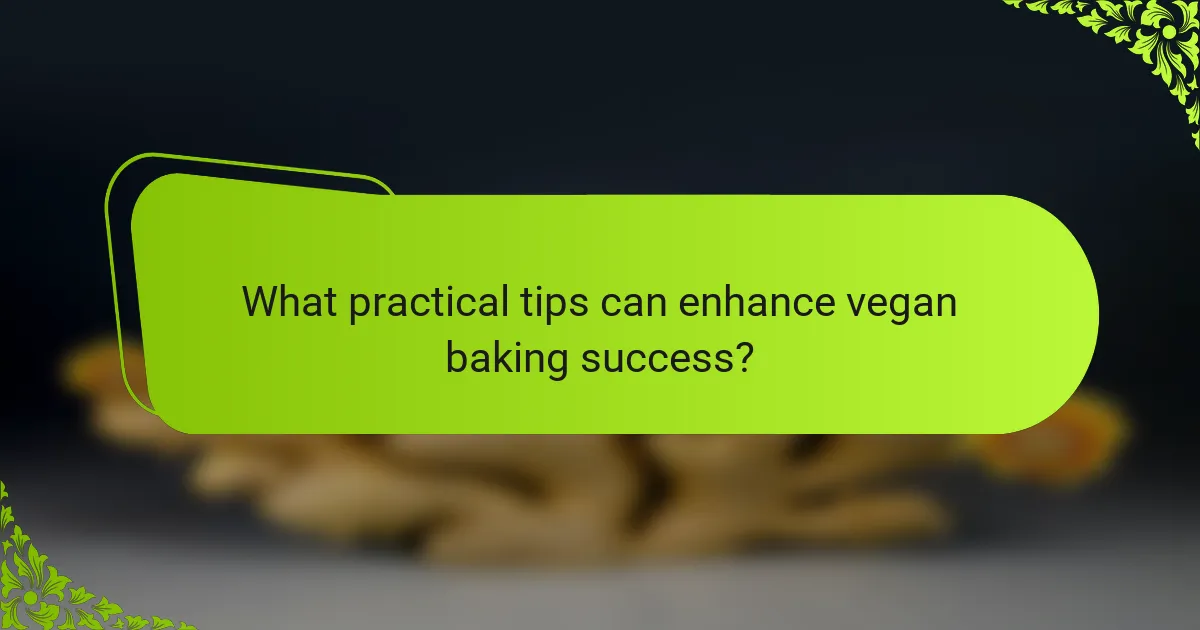
What practical tips can enhance vegan baking success?
To enhance vegan baking success, focus on using the right substitutes for eggs and dairy. Common egg replacements include flaxseed meal or chia seeds mixed with water. These ingredients help bind baked goods effectively. For dairy, use plant-based milk, yogurt, or aquafaba as alternatives. Adjusting baking times may be necessary, as vegan recipes can differ in moisture content. Incorporate baking powder and baking soda to ensure proper leavening. Additionally, consider adding extra flavor with vanilla extract or spices. These tips are supported by numerous vegan baking resources that emphasize the importance of ingredient adaptation for desired texture and flavor.
How can one troubleshoot common issues in vegan baking?
To troubleshoot common issues in vegan baking, start by identifying the specific problem. For instance, if baked goods are too dense, consider increasing the leavening agent. Adding more baking powder or baking soda can help achieve a lighter texture. If the batter is too dry, incorporate additional liquid ingredients like plant milk or applesauce. This adjustment can improve moisture levels.
For issues with rising, ensure the baking powder is fresh and not expired. Old leavening agents can lead to poor results. If the flavor is lacking, enhance it with spices or extracts, such as vanilla or almond. This can elevate the overall taste profile.
If texture is gritty, check the flour type used. Using a finer flour can create a smoother consistency. For overly sweet results, reduce the sugar content or substitute with less sweet alternatives like ripe bananas.
Monitoring baking time and temperature is also crucial. Adjusting these factors can prevent undercooking or overbaking. Lastly, keeping detailed notes on ingredient ratios and methods can help refine the process for future baking endeavors.
What are the best practices for achieving the perfect vegan cake?
To achieve the perfect vegan cake, use high-quality plant-based ingredients. Substitute eggs with flaxseed meal or applesauce for binding. Incorporate plant-based milk to maintain moisture. Use baking soda and vinegar as leavening agents for fluffiness. Ensure accurate measurements for consistent results. Mix wet and dry ingredients separately before combining them. Avoid overmixing to prevent a dense texture. Bake at the correct temperature, typically around 350°F (175°C), to ensure even cooking. These practices enhance flavor and texture, leading to a successful vegan cake.
How can one ensure moisture and texture in vegan baked goods?
To ensure moisture and texture in vegan baked goods, incorporate ingredients that retain moisture. Common choices include applesauce, mashed bananas, or nut butters. These ingredients add both moisture and flavor to the final product. Additionally, using non-dairy milk can enhance texture and moisture content.
Flaxseed meal or chia seeds mixed with water can act as binding agents, contributing to the overall texture. It is also important to monitor baking time to prevent dryness. Overbaking can lead to a loss of moisture, affecting the final result.
Finally, consider using a combination of flours. Whole grain flours can absorb more moisture than all-purpose flour, leading to better texture. These techniques and ingredient choices contribute significantly to the success of vegan baking.
What resources are available for improving vegan baking skills?
Books focused on vegan baking are valuable resources. Titles like “Vegan Cupcakes Take Over the World” provide recipes and techniques. Online courses on platforms like Skillshare and Udemy offer structured learning. YouTube channels dedicated to vegan cooking demonstrate practical skills. Blogs such as Minimalist Baker feature recipes and tips. Social media groups and forums connect bakers for support and advice. Local workshops often teach hands-on vegan baking skills. These resources collectively enhance vegan baking proficiency.
Which cookbooks or websites offer great vegan baking recipes?
“Vegan Baking for Beginners” by Carla Kelly is a notable cookbook offering great vegan baking recipes. It includes simple, accessible recipes tailored for new bakers. Another excellent resource is the website Minimalist Baker. This site features over 100 vegan baking recipes that require 10 ingredients or less. The recipes are easy to follow and often include helpful tips. Additionally, “Vegan Cupcakes Take Over the World” by Isa Chandra Moskowitz and Terry Hope Romero is a popular choice. It provides a variety of creative vegan cupcake recipes. These cookbooks and websites are highly regarded in the vegan baking community for their quality and variety.
How can one join a community for vegan baking enthusiasts?
To join a community for vegan baking enthusiasts, one can start by searching for online forums and social media groups dedicated to vegan baking. Websites like Facebook and Reddit host numerous groups where members share recipes and tips. Additionally, attending local vegan baking classes or workshops can connect individuals with like-minded enthusiasts. Many community centers or health food stores offer these classes. Joining platforms like Meetup can also help find local vegan baking events. Engaging with vegan baking blogs and websites often leads to community links and forums. Finally, participating in vegan baking competitions can provide networking opportunities with fellow bakers.
Vegan baking essentials encompass plant-based ingredients and techniques that replace traditional animal-based products, including flour, sugar, baking powder, and various substitutes for eggs and dairy. The article explores key methods in vegan baking, such as ingredient substitutions, moisture retention, and the impact of temperature on baked goods. It highlights the health benefits associated with vegan baking, including lower saturated fat intake and increased fiber, while also addressing common mistakes and best practices to enhance baking success. Additionally, resources for improving vegan baking skills and ways to engage with the vegan baking community are provided.
